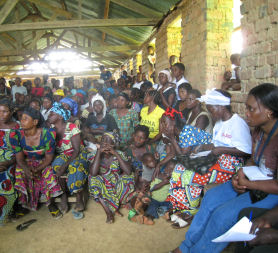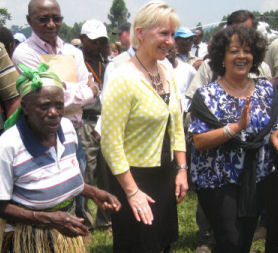Arrests and renewed momentum on rape in Congo
 Lindsey Hilsum
International Editor
Lindsey Hilsum
International Editor
A UN official has called the Democratic Republic of Congo “the rape capital of the world” – but there’s renewed momentum to tackle the sexual violence in the country, as Lindsey Hilsum discovers.

Shedla Abedi’s age was no protection when the rapists came to her village, writes Channel 4 News International Editor Lindsey Hilsum.
“Imagine – a young boy of 20, and me aged 62, old enough to be his grandmother,” she said. She pointed to a frail, older woman walking with a stick. “Her too,” she said, “And she’s over 80.”
The women of Kampala village, where 35 were raped, still sleep in the forest at night, for fear the rapists will return. Earlier this month, they gathered in the village to tell their troubles to Margot Wallstrom, the UN Secretary General’s Special Representative on Sexual Crime in Conflict.
“This is our cry for help. We are in pain,” said Ms Abedi, to cheers and applause. “You are our fellow women and we believe our enemies wouldn’t hesitate to rape you if they were given the opportuntity. They are merciless.”
The mass rape of more than 300 women, several men and children in villages deep in the forest of the eastern Democratic Republic of Congo at the beginning of August, has renewed momentum to tackle the sexual violence in what Ms Wallstrom has called “the rape capital of the world.”
Tomorrow she will present to the Security Council the findings of her recent visit.
This is our cry for help. We are in pain. Shedla Abedi, rape victim in Congo.
“I think we have a window of political opportunity,” she said.
The prosecutor of the International Criminal Court in The Hague is sending a team to investigate the mass rape, which occurred in a dozen villages between Walikale and Kibua, in North Kivu, between July 30th and August 2nd.
See a photo gallery of the women in Congo telling the UN their stories
Arrests
On Monday, Callixte Mbarushimana, executive secretary of the Forces Démocratiques pour la Libération du Rwanda, one of the rebel groups implicated, was arrested under an ICC warrant in Paris where he had been living. The core of the FDLR are Hutus who fled Rwanda after participating in the genocide of Tutsis in 1994, and are accused of war crimes in the Congo.
ICC Prosecutor Luis Moreno-Ocampo described the arrest of Mr Mbarushimana as a “crucial step in efforts to prosecute the massive sexual crimes committed in the DRC.”
The court is expected to issue more warrants in the coming weeks in connection with the August rapes and previous war crimes.
Last week, UN peacekeepers arrested Lieutenant Colonel Sadoke Kokunda Mayele, who was identified by several villagers as a commander of the rapists. A deserter from the Congolese army, Mayele was fighting with a militia known as Mai Mai Cheka. He and several others surrendered in the jungle town of Walikale and were later handed over to the Congolese authorities.

Although a peace treaty in 2003 formally brought to an end the decade long war in the Congo – which at its height sucked in troops from seven other African countries – atrocities, primarily against women, have not subsided.
Militia groups and the Congolese army now fight over access to mining areas around Bisie and Omate, where they exploit gold as well as coltan and cassiterite, used in mobile phones and other electronic goods.
“It’s not a problem which can wait until we get peace, it’s something we have to start resolving now in order to get peace,” said Ms Wallstrom.
Rape as humiliation
Rape is a way of humiliating and cowing local populations who may be used as slave labour, but the scale and systematic nature of the August incident shocked even local doctors who have seen many horrors.
“It’s the first time I have seen something like this,” said Dr Cris Baguma of the International Medical Corps, one of the first organisations to help the women. “I can’t understand it, because they didn’t kill people, it was only for rape.”
I can’t understand it, because they didn’t kill people, it was only for rape. Dr Cris Baguma of the International Medical Corps.
UN peacekeepers have been widely blamed for failing to prevent the attack. A preliminary internal UN enquiry found that the nearest contingent of 80 Indian soldiers had no training in protecting civilians – even though that is their mandate – and employed only one Congolese interpreter.
The UN is meant to support Congolese forces, but they are often as brutal and ill-disciplined as the militia and rebels they are fighting.
A confidential UN report, seen by Channel 4 News, said that “attacked villages were vulnerable as all FARDC (Congolese army) soldiers left in July 2010 to participate in ‘lucrative’ military operations in Omate and Bisie mining area.”
After the rapes, the government of President Joseph Kabila announced a temporary ban on mining, which may be lifted later this week, when a new “centre de negoces” should open at Mubi, near Bisie. The idea is that government agents should tax the miners rather than leave them to run a gamut of illegal roadblocks manned by rebels, militia and rogue soldiers, but this seems unlikely to stop the brutality.
UN sources say that several battalions of government troops, which have fanned out across the jungle around Walikale since the mass rape, are not provisioned. They are now preying on the population, looting and raping.
Responding to pressure from activists, the US Congress has approved a new financial reform law which includes a clause requiring US-listed companies to disclose whether their products contain “conflict minerals” from the DRC.
“There has to be reaction from EU, from countries all over the world to support and follow suit,” said Ms Wallstrom. “There’s also a responsibility on consumers and those who manufacture these articles.”
I was raped by eight men, and they kidnapped my five month old baby. I was screaming ‘I’m dying’. Sikiliza Buunda, rape victim in Congo.
In Nyasi village, the women tell Channel 4 News they will only feel safe if UN peacekeepers patrol more often and stay close.
“I was raped by eight men, and they kidnapped my five month old baby,” said Sikiliza Buunda. “I was screaming ‘I’m dying’. The whole forest was on fire. Women, children and men were all screaming throughout the forest. It was a nightmare.”
Her friend, Mawaza Misori, said: “We don’t know the real reason these people won’t leave us alone. It’s like the devil attacking for no reason. We had the courage to speak out in public because we’ve had enough. We’re like dying people, who are no longer afraid because they know they’re at the end of their journey.”
Lindsey Hilsum’s film on rape in the DR Congo will be broadcast on Channel 4 News tonight at 7pm. Read Lindsey’s blog about meeting the women in Congo.